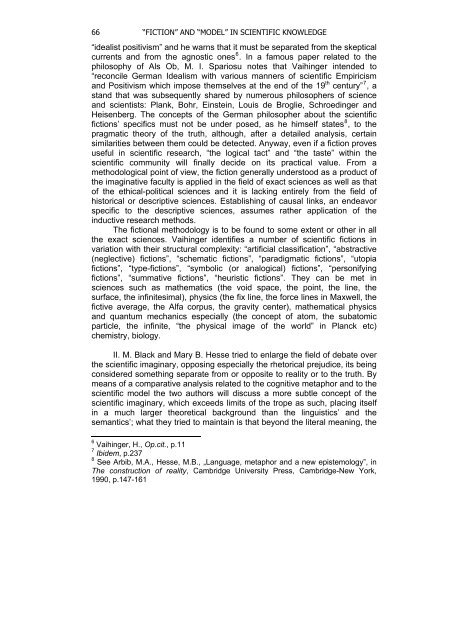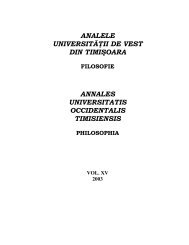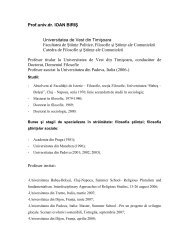VOL. IV (XXI) 2009 - Departamentul de Filosofie si Stiinte ale ...
VOL. IV (XXI) 2009 - Departamentul de Filosofie si Stiinte ale ...
VOL. IV (XXI) 2009 - Departamentul de Filosofie si Stiinte ale ...
You also want an ePaper? Increase the reach of your titles
YUMPU automatically turns print PDFs into web optimized ePapers that Google loves.
66 “FICTION” AND “MODEL” IN SCIENTIFIC KNOWLEDGE<br />
“i<strong>de</strong>alist po<strong>si</strong>tivism” and he warns that it must be separated from the skeptical<br />
currents and from the agnostic ones 6 . In a famous paper related to the<br />
philosophy of Als Ob, M. I. Spariosu notes that Vaihinger inten<strong>de</strong>d to<br />
“reconcile German I<strong>de</strong>alism with various manners of scientific Empiricism<br />
and Po<strong>si</strong>tivism which impose themselves at the end of the 19 th century” 7 , a<br />
stand that was subsequently shared by numerous philosophers of science<br />
and scientists: Plank, Bohr, Einstein, Louis <strong>de</strong> Broglie, Schroedinger and<br />
Heisenberg. The concepts of the German philosopher about the scientific<br />
fictions’ specifics must not be un<strong>de</strong>r posed, as he himself states 8 , to the<br />
pragmatic theory of the truth, although, after a <strong>de</strong>tailed analy<strong>si</strong>s, certain<br />
<strong>si</strong>milarities between them could be <strong>de</strong>tected. Anyway, even if a fiction proves<br />
useful in scientific research, “the logical tact” and “the taste” within the<br />
scientific community will finally <strong>de</strong>ci<strong>de</strong> on its practical value. From a<br />
methodological point of view, the fiction generally un<strong>de</strong>rstood as a product of<br />
the imaginative faculty is applied in the field of exact sciences as well as that<br />
of the ethical-political sciences and it is lacking entirely from the field of<br />
historical or <strong>de</strong>scriptive sciences. Establishing of causal links, an en<strong>de</strong>avor<br />
specific to the <strong>de</strong>scriptive sciences, assumes rather application of the<br />
inductive research methods.<br />
The fictional methodology is to be found to some extent or other in all<br />
the exact sciences. Vaihinger i<strong>de</strong>ntifies a number of scientific fictions in<br />
variation with their structural complexity: “artificial clas<strong>si</strong>fication”, “abstractive<br />
(neglective) fictions”, “schematic fictions”, “paradigmatic fictions”, “utopia<br />
fictions”, “type-fictions”, “symbolic (or analogical) fictions”, “personifying<br />
fictions”, “summative fictions”, “heuristic fictions”. They can be met in<br />
sciences such as mathematics (the void space, the point, the line, the<br />
surface, the infinite<strong>si</strong>mal), phy<strong>si</strong>cs (the fix line, the force lines in Maxwell, the<br />
fictive average, the Alfa corpus, the gravity center), mathematical phy<strong>si</strong>cs<br />
and quantum mechanics especially (the concept of atom, the subatomic<br />
particle, the infinite, “the phy<strong>si</strong>cal image of the world” in Planck etc)<br />
chemistry, biology.<br />
II. M. Black and Mary B. Hesse tried to enlarge the field of <strong>de</strong>bate over<br />
the scientific imaginary, oppo<strong>si</strong>ng especially the rhetorical prejudice, its being<br />
con<strong>si</strong><strong>de</strong>red something separate from or oppo<strong>si</strong>te to reality or to the truth. By<br />
means of a comparative analy<strong>si</strong>s related to the cognitive metaphor and to the<br />
scientific mo<strong>de</strong>l the two authors will discuss a more subtle concept of the<br />
scientific imaginary, which exceeds limits of the trope as such, placing itself<br />
in a much larger theoretical background than the linguistics’ and the<br />
semantics’; what they tried to maintain is that beyond the literal meaning, the<br />
6 Vaihinger, H., Op.cit., p.11<br />
7 Ibi<strong>de</strong>m, p.237<br />
8 See Arbib, M.A., Hesse, M.B., „Language, metaphor and a new epistemology”, in<br />
The construction of reality, Cambridge Univer<strong>si</strong>ty Press, Cambridge-New York,<br />
1990, p.147-161




